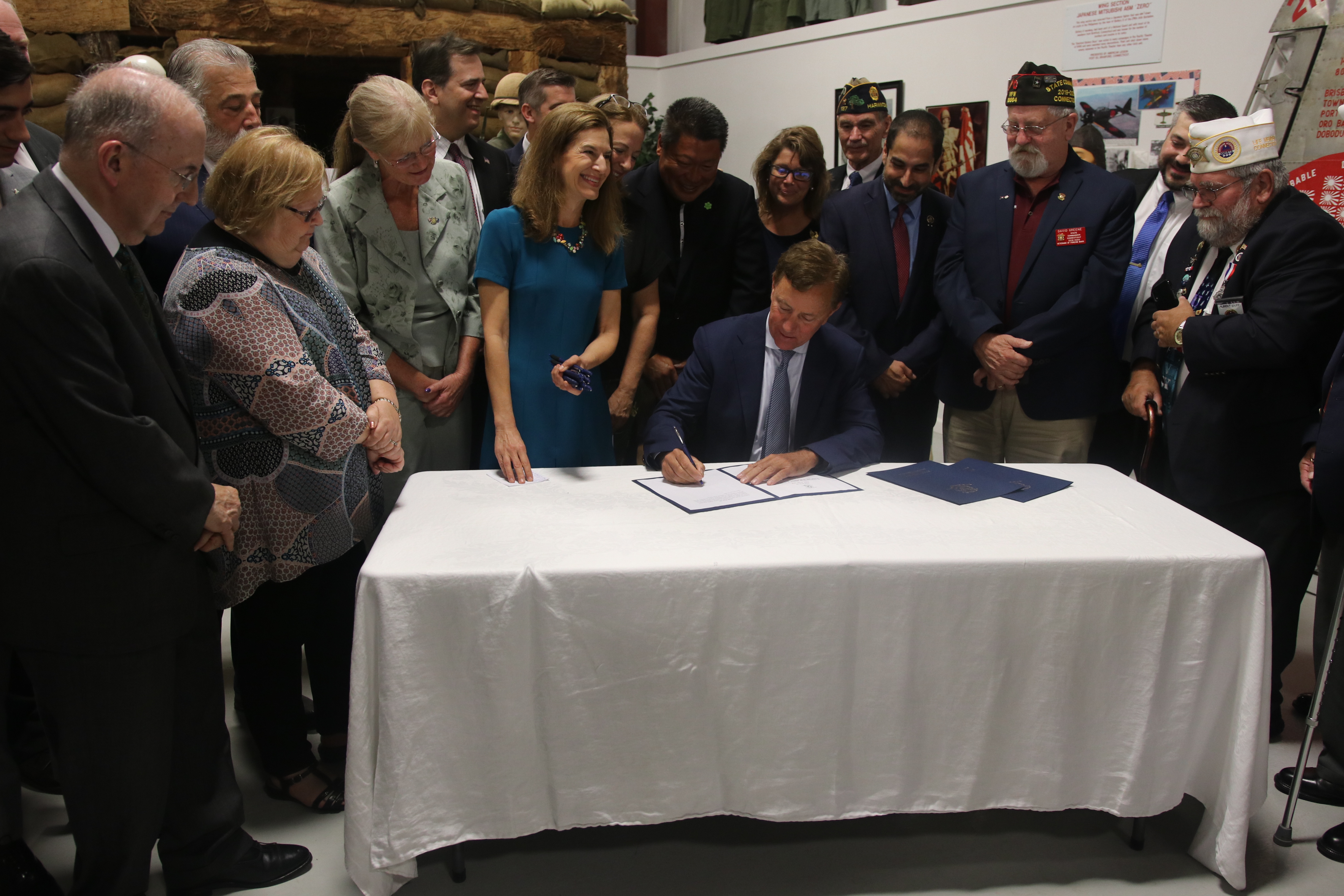
Gov. Ned Lamont signed three bills into law Aug. 29 to help Connecticut veterans, one of which was authored by Sen. James Maroney. Photo courtesy of James Maroney.
Joined by military veterans, legislators and advocates, state Sen. James Maroney’s (D-Milford) legislation to establish the Military to Machinist program was signed into law by Gov. Ned Lamont Aug. 29 at the West Haven Veterans Museum and Learning Center.
Maroney’s bill was one of three new laws adopted with the intention of expanding the ability of veterans to access certain state services and provide assistance after they have returned to civilian life.
The Military to Machinist program, which Maroney authored and led passage of, will establish certain job training programs to assist veterans with the skills needed to obtain jobs in advanced manufacturing and other related positions. The other pieces of legislation signed into law expand eligibility for veterans to receive certain state benefits and provide greater property tax relief for veterans.
Maroney, who is also co-chair of the Veterans’ Affairs Committee, said these pieces of legislation are a show of gratitude for what Connecticut’s veterans have sacrificed and will greatly improve their quality of life.
“As co-chair of the Veterans’ Affairs Committee, I am pleased to see these important bills be signed into law,” he said. “The Military to Machinist program is a piece of legislation I authored, led passage of and am incredibly excited about. This law will assist veterans in making the oftentimes challenging transition from military to civilian life easier and rewarding. In addition to helping our state’s courageous heroes, we are also strengthening the advanced manufacturing industry with committed, hard-working and intelligent veterans to join their strong and successful workforce. I am eager to see all the ways in which this will benefit our state’s heroes, who have sacrificed so much for our state and our country.”
Lamont thanked the co-chairs and ranking members of the committee, who played integral roles in advocating for the bills throughout the legislative process and getting them approved so that he could sign them into law. State Rep. Dorinda Borer (D-West Haven), who is co-chair of the committee with Maroney, agreed with the senator that these laws will have a positive effect on the lives of veterans and their families.
“Connecticut service members deserve support from the communities they worked so hard to protect,” Borer said. “The passage of these measures, which provide economic relief for our veterans, have been a long time coming and I am honored to have helped lead the charge in turning these ideas into policy.”
The bills include:
– Public Act 19-129, An Act Establishing the Military to Machinists and Veterans Platform to Employment Pilot Programs and Providing Other Employment Assistance to Veterans. This bill requires the workforce development board for Connecticut’s southwest region to develop and operate a Military to Machinists pilot program that will assist veterans in earning an advanced manufacturing certificate from a qualifying program and secure employment in the field upon certificate completion.
In addition, the board must develop and operate a Veterans Platform to Employment pilot program, which will provide training and subsidized employment for veterans who have experienced long-term unemployment, including skills assessments, career readiness workshops, and other tools.
Finally, it requires the board to identify appropriate written materials on mental health conditions common to veterans that will be distributed to employers.
– Public Act 19-33, An Act Concerning the Definition of “Service in Time of War” and State Residency Requirements for Certain Veterans’ Services. This bill extends certain state war service benefits to veterans who have served less than 90 days in a period of war because they incurred or aggravated an injury in the line of duty that is not a service-connected disability rated by the U.S. Department of Veterans Affairs.
It also removes a prior law that required a two-year state residency eligibility for certain state benefits (e.g. hospital care and funeral expenses) for veterans who did not reside in Connecticut at the time of their enlistment or induction into the military.
– Public Act 19-171, An Act Concerning the Property Tax Exemption for Service Members and Veterans Having Disability Ratings. This bill increases the base property tax exemption for certain disabled service members and veterans by $500. By doing to, it increases the additional income-based exemption for such service members and veterans by $250 or $1,000, depending on their income. This is calculated using the base exemption corresponding with an individual’s disability rating.
All three of the bills go into effect Oct. 1.